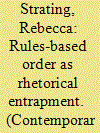| Srl | Item |
| 1 |
ID:
189981


|
|
|
|
|
| Summary/Abstract |
After more than 25 years of scholarship, the deliberative turn in international relations (IR) theory is ready to be revisited with a fresh perspective. Using new methods from automated text analyses, this explorative article investigates how rhetoric may bind action. It does so by building upon Schimmelfennig’s original account of rhetorical entrapment. To begin, I theorize the opposite of entrapment, which I call rhetorical hollowing. Rhetorical hollowing describes a situation in which actors use normative rhetoric, but instead of advancing their interests, such rhetoric fails to increase their chances of obtaining the desired outcome because the normative force of their rhetoric has eroded over time. To provide plausibility to both entrapment and hollowing, I present two mechanisms by which language is connected with action in the United Nations Security Council. Finally, I run a series of time-series-cross-section models on selected dictionary terms conducive to entrapment or hollowing on all speeches and an original Security Council resolution corpus from 1995 to 2017. The research shows that while mentioning ‘human rights’ is consistently associated with increased odds of authorization of force; the word ‘terrorism’ is associated with a decrease of odds for intervention. This finding suggests that some terms may not only entrap or hollow but also normatively backfire.
|
|
|
|
|
|
|
|
|
|
|
|
|
|
|
|
| 2 |
ID:
148028


|
|
|
|
|
| Summary/Abstract |
In 2006, Norway launched a stand-alone process to negotiate a ban on cluster munitions. The United Kingdom (UK) reluctantly joined the process to keep it within acceptable bounds. The UK acted as a spoiler in the negotiations. Yet, in the end, it agreed to ban all cluster munitions and became a champion of the new treaty. Why? I argue that two factors constrained and enticed the UK to go along with the process. First, small states and non-governmental organizations (NGOs) structured the negotiations to disadvantage potential opponents. Second, NGOs also used shaming and praising to define the “desirable” UK policy. Not only did the UK accept a comprehensive ban, but it also started championing it as a result of two mechanisms—“cooperative bargaining” at the end of negotiations that led to a fair compromise and “mobilization of pride” by NGOs praising it for supporting the new norm. Whereas usually the success of weak actors in international negotiations is attributed to the persuasive power of their arguments, I show that strategic action by small states and NGOs may prove crucial in engineering the conditions both for their success and the rhetorical entrapment of stronger actors, such as the UK.
|
|
|
|
|
|
|
|
|
|
|
|
|
|
|
|
| 3 |
ID:
192520


|
|
|
|
|
| Summary/Abstract |
In response to challenges to Asia’s security order, regional powers such Australia, India, and Japan have adopted new “Indo-Pacific” strategic narratives to promote and defend the “rules-based order.” These narratives use China’s maritime disputes with smaller neighbors in the South China Sea as a key example of Beijing’s revisionist intentions. Yet such narratives expose “rules-based order” advocates to risks of “rhetorical entrapment” as other actors compel them to abide by the standards they have set. To what extent have Indo-Pacific powers been forced to follow the rules in their own asymmetrical maritime disputes? This article examines three Indo-Pacific cases: Timor Sea Compulsory Conciliation between Australia and Timor-Leste, the Chagos Island Marine Protected Area Arbitration between the United Kingdom and Mauritius, and the Bay of Bengal Maritime Boundary Arbitration between India and Bangladesh. To varying degrees, this article finds that strategic narratives constrained the policy options of all three Indo-Pacific powers.
|
|
|
|
|
|
|
|
|
|
|
|
|
|
|
|